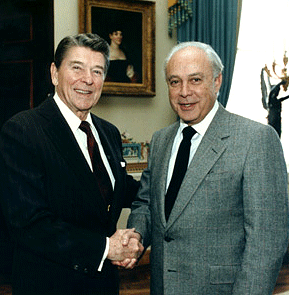Persuasion
3 Decisions That Shaped Robert Strauss’ Legacy of Influence
Robert Strauss’s agility made him one of America's most influential people.
Posted March 20, 2014

In a world that stubbornly refuses to stop changing, agility has become the secret to success and happiness. Perhaps nobody in modern American history better exemplifies agility in the face of rapid change than the recently deceased Robert Strauss, advisor to presidents Lyndon Johnson, Jimmy Carter, Ronald Regan, and George H.W. Bush.
Loved by some and hated by others, Strauss was universally regarded as an agile leader and an influential advisor who never let himself get bogged down by rigid dogma. In Strauss, we saw a decision-maker who instinctively combined that rare combination of strategic thinking and decisive action.
Strauss decided NOT to let ideology interfere with impact. After serving as chairman of the Democratic Party, running Jimmy Carter’s successful 1976 campaign, and serving as one of Carter’s chief presidential advisors, Strauss became an advisor to the era’s conservative torch-bearers, Ronald Reagan and George H.W. Bush. To some, this made Strauss nothing but a turncoat.
Jimmy Carter quipped that “Bob Strauss is a very loyal friend… he waited a whole week after the election before he had dinner with Ronald Reagan.” Technically, Strauss had lunch with Nancy Reagan, and not dinner with Ronald, but Carter’s point remains.
On the other hand, we must credit Strauss for recognizing that Carter’s 1980 defeat to Reagan was more than a failed campaign, but a signal of the seismic shift in the average American’s values and priorities. Strauss faced a critical strategic decision—either sulk with the party’s other Carter supporters or immediately start working to influence the competition’s decisions from the inside.
So does that mean that “agile” and “adaptive” are just pleasant synonyms for “flaky” and “duplicitous?” Not so fast.
Strauss decided to “stick to his knitting.” Shortly after his victory in the 1988 presidential election, the elder George Bush called on Strauss to be Ambassador to the Soviet Union during the USSR’s tumultuous transition to a more Democratic government. A cynic might conclude that this was just one more case of Strauss playing double-agent. However, Bush Senior chose Strauss for the role precisely because his fellow Texas-native had told Bush point-blank that he had never voted for him—and probably never would.
This is perhaps the often misunderstood secret of strategic agility—as a person or an organization. Being agile does not mean drifting with the breeze. Successful agility means anchoring yourself at your internal core, while remaining constantly ready to turn and face the winds of change from whichever direction they might blow.
It’s sort of like maintaining a pivot foot in basketball. Even though your foot can’t move, you get to decide whether you want to shoot, pass, or twist your body in whichever direction makes most sense in the present situation.
Strauss used bad decisions to make good decisions. The thirteenth century Turkish sage Nasreddin once said, “Good decisions come from experience, but experience comes from bad decisions.”
Early in his career, Strauss made a bad decision that transformed into a good decision-maker. Lyndon Johnson was the first president to ask Strauss for his advice. Strauss had yearned for just such an opportunity. But when the notoriously intimidating LBJ asked for his opinion on the fledgling Vietnam War, Strauss balked. He decided not to tell Johnson what he really thought, and instead told Johnson that he thought the war made sense. He deeply regretted that decision and vowed from that day forward that he would never again hold back his true views from a President. Counterintuitively, that decision is exactly what made the Regan Administration ask Strauss to change President Reagan’s mind about his approach to handling the Iran-Contra Hearing, and it is what earned Strauss the ambassadorship to the Soviet Union.
Whether you loved him or hated him, it’s hard to argue with Strauss’s description of himself as “a centrist, a worker, a doer, a putter-together.” At the end of a 95-year run, those aren’t such bad epitaphs.
————
Google +: https://plus.google.com/+NickTasler
Facebook: https://www.facebook.com/pages/Nick-Tasler/619818501371359
LinkedIn: www.linkedin.com/in/nicktasler/


